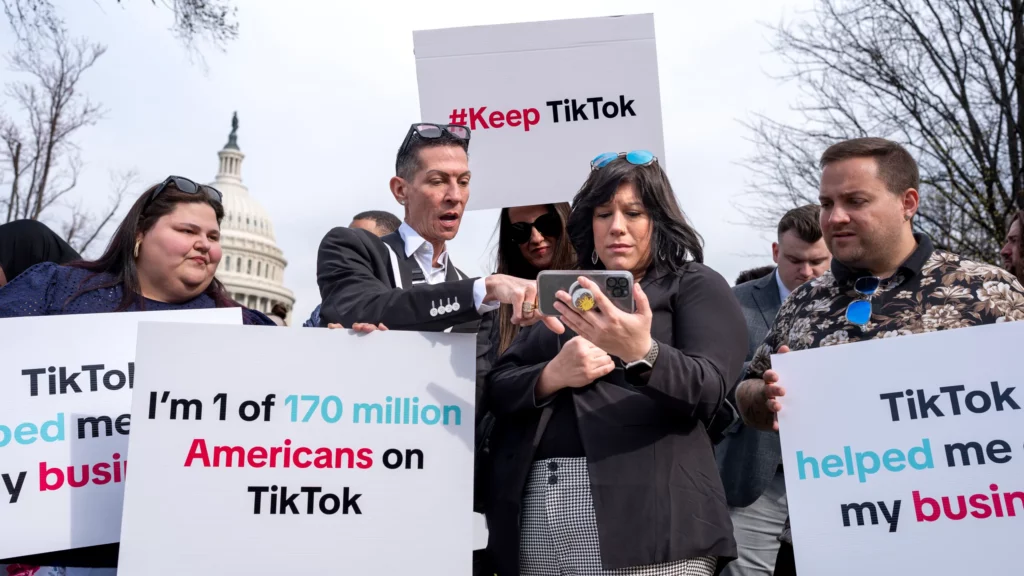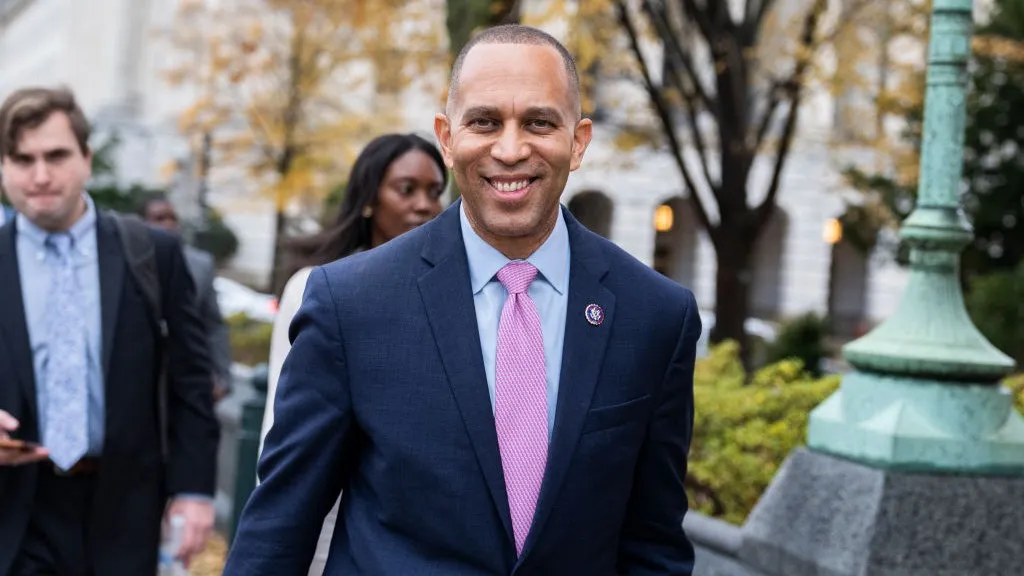
A significant bill has been approved by the US House of Representatives, potentially leading to the prohibition of TikTok in America.
The social media giant’s Chinese parent company, ByteDance, has been given a six-month ultimatum to sell its controlling stake or face the possibility of the app being blocked in the US.
Although the bill received strong support from both sides of the aisle, it must still navigate through the Senate and receive the president’s signature in order to be enacted as law.
Lawmakers have expressed ongoing concerns regarding China’s influence on TikTok.
TikTok is under the ownership of ByteDance, a Chinese company that was established in 2012.
The company is headquartered in Beijing and has offices in various locations across Europe and the US.
If the bill successfully secures approval in the Senate, President Joe Biden has pledged to promptly sign it, potentially leading to a diplomatic disagreement with China.
ByteDance would need to obtain approval from Chinese officials in order to finalize a compelled divestiture, a move that Beijing has pledged to resist. The foreign ministry spokesperson warned that the decision would have consequences for the US.
According to Mike Gallagher, a Wisconsin Republican who played a role in drafting the bill, it is crucial for the United States to avoid the potential dangers of having a single news platform in America that is controlled or owned by a company with ties to the Chinese Communist Party.
Chinese companies are obligated to share data with the government upon request due to a national security law.
TikTok has made efforts to address concerns from regulators regarding the protection of user data. It has implemented measures to ensure that the information of its 150 million users in the US remains separate from ByteDance employees in China.
TikTok’s CEO, Shou Zi Chew, emphasized the company’s dedication to maintaining data security and ensuring a platform that is not susceptible to external manipulation.
The bill, if approved, could potentially result in the app being banned in the US. This would give “more power to a select few social media companies” and could potentially jeopardize numerous American jobs.
Nevertheless, a thorough examination conducted by the Wall Street Journal in January revealed that the system remained “porous,” as data was informally exchanged between TikTok in the US and ByteDance in China. Recent incidents involving ByteDance employees in China accessing a journalist’s data to track down their sources have raised concerns.
Before the vote, Hakeem Jeffries, the leading Democrat in the House, expressed support for the bill, emphasizing its potential to protect TikTok user data and safeguard privacy from foreign threats.
Senate Majority Leader Chuck Schumer announced that the chamber will now undertake a thorough review of the legislation.
The bill’s future in the upper chamber of Congress is uncertain following remarks from Republican White House candidate Donald Trump.
The former president, who previously attempted to prohibit the app during his time in office, has since altered his stance following a recent meeting with Republican donor Jeff Yass, who is said to have a small ownership interest in ByteDance.
Several House members also expressed their opposition on Wednesday, echoing Mr. Trump’s stance. According to a post on social media, Marjorie Taylor Greene, a Republican from Georgia, expressed concerns about the potential implications of the bill. She suggested that Congress could use it as a means to compel the sale of other corporations under the guise of safeguarding US data from foreign adversaries.
Several Democrats are also against a ban, concerned that it may alienate the app’s young userbase while the party works to maintain support among younger voters.

However, the leaders of the Senate intelligence committee expressed their approval of the House vote. Mark Warner, a Democrat, and Marco Rubio, a Republican, expressed their commitment to guiding the bill through the chamber.
“In a statement, they expressed their shared concern regarding the potential national security implications of TikTok. They highlighted the platform’s significant influence and its potential to create divisions among Americans. They also pointed out that TikTok’s parent company, ByteDance, is legally obligated to comply with the Chinese Communist Party’s directives,” the statement read.
Following the vote, TikTok seemed to intensify its efforts to encourage users to engage with Congress, as it sent out another notification urging them to reach out to their representatives. Last week, there was a similar occurrence where congressional offices received an overwhelming number of calls. According to some staffers, this action had intensified opposition towards the company.
A small group of supporters gathered outside the White House on Wednesday to voice their opposition to the bill. Tiffany Yu, a young disability advocate from Los Angeles, emphasized the importance of the platform for her work in an interview with the BBC.
“Fifteen years ago, I could only imagine reaching a small audience of 30 to 40 individuals,” she reflects. Now, she possesses a vast fortune. Another protester, Ophelia Nichols, emphasized the detrimental effects of the bill on American businesses.
“It’s disappointing, at the House,” she said.
According to Mona Swain, a 23-year-old content creator, the income she receives from the app is helping her support her mother’s mortgage and her siblings’ college educations.
“Being laid off during this tumultuous period in my life, as well as in the lives of many other creators, is incredibly daunting,” Ms. Swain expressed to Reuters news agency.
The Chinese foreign ministry’s spokesperson expressed their view that despite the lack of evidence showing TikTok as a threat to US national security, the United States continues to suppress the platform.
This type of aggressive behavior, which fails to succeed through fair competition, disrupts the regular business operations of companies, undermines the trust of international investors in the investment climate, and harms the established international economic and trade system.
However, according to White House Spokesperson Karine Jean Pierre, the bill aims to prevent major technology platforms operating in the US from being controlled by individuals who may exploit them.
Despite the potential approval for ByteDance to sell its stake in TikTok, it remains uncertain if any of its rivals possess the necessary funding to make a bid for the platform. The company has previously estimated the app’s value to be approximately $268 billion. The high cost may deter potential investors.
However, experts informed the BBC that there is a considerable number of potential buyers in the United States. It remains uncertain which deal could ultimately prevail, considering the financial implications and the tech sector’s concerns about anti-monopoly issues.
“All major social media companies would likely show interest, although they may encounter significant obstacles related to anti-trust regulations… According to Emarketer analyst Jasmine Enberg, there are smaller firms in the social media space, such as Snapchat, that might be interested in the news but may not have the financial means to afford it.
In 2020, following an order from the Trump administration, several prominent US firms stepped forward to consider making bids for the sale. These bids were said to have valued the firm at approximately $50bn.
Microsoft was ultimately unsuccessful in their bid, as a team consisting of Walmart and software giant Oracle, led by Larry Ellison and Safra Catz, who had connections with the Trump administration, emerged as the winners. The agreement unraveled due to legal obstacles and the transition to a different administration.
Today, there has been a significant increase in TikTok’s reach and advertising revenue. According to research firm Emarketer, TikTok’s ad revenue from the US is projected to reach approximately $8.66 billion this year, a significant increase from the less than $1 billion generated in 2020.





More Stories
Trial for Rape and Human Trafficking will take Place in Romania for Andrew Tate and his Brother Tristan
A British individual tests the first Customised Melanoma Vaccination
Gaza Baby Delivered from Dead Mother’s Womb Perishes